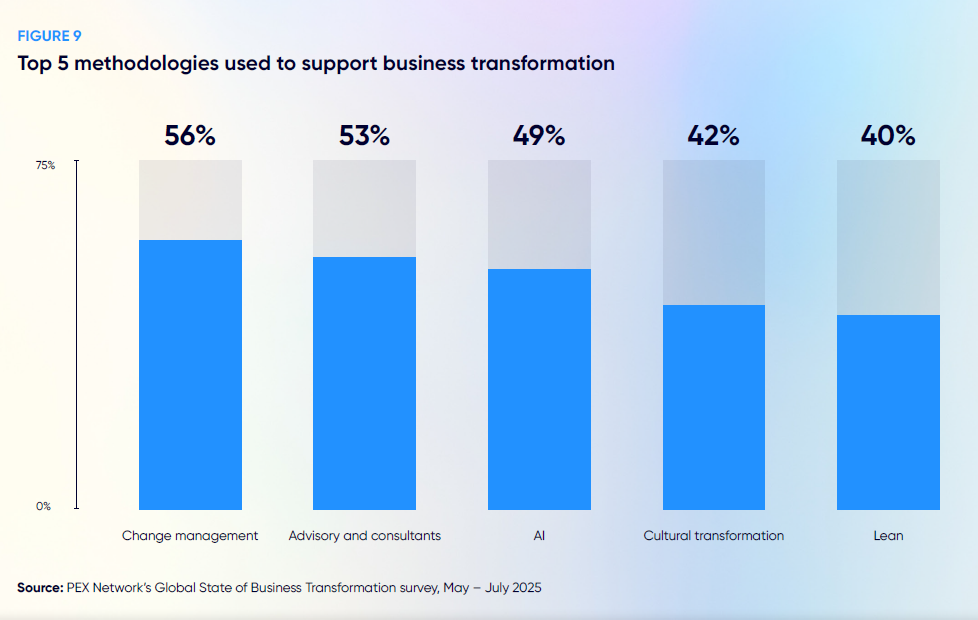Change management tops list of business transformation methodologies
34 percent of businesses are planning to advance change management approaches in the next 12 months
Add bookmark
Change management is the leading methodology organizations use to support business transformation. That’s a key finding from the PEX Report 2025/26, based on the results of a survey of more than 200 professionals.
More than half (58 percent) of respondents apply change management in their business transformation strategies, ahead of advisors and consultants (53percent) and cultural transformation (42 percent).
Meanwhile, 34 percent of businesses are planning to advance change management approaches in the next 12 months. However, change management is also one of the biggest business transformation challenges respondents expect to face in the coming year, cited by 39 percent of those polled. This is behind cost/budget limitations (58 percent).
Join the PEX Network community

Don't miss any news, updates or insider tips from PEX Network by getting them delivered to your inbox. Sign up to our newsletter and join our community of experts.
Learn MoreChange management’s importance is clear
Julie Whitten, VP of change management and communications at Upstate Niagara Dairy Cooperative, said it is of little surprise that change management is the most applied method in business transformation. “If anything, it validates what many of us have learned firsthand: transformation is never just about processes or technology, it lives and dies by how well you prepare people to adopt, adapt and sustain it.”
It is crucial to weave structured, people-centered change management into the entire lifecycle of transformation, from design to execution and well beyond the go-live date, Whitten added. “Change doesn’t ‘stick’ just because a project closes. Sustaining new ways of working takes continuous reinforcement, clear accountability and leaders who role model what good looks like long after the spotlight has moved on.”

The “people side” of business transformation
Organizations must understand that they can roll out the best strategy or tool in the world, but if people don’t understand it, believe in it or know how to operate in the new environment, they are not going to see the results they are hoping for, said Laura Karpf, senior manager, change at Sodexo. “The people side (the adoption, the mindset shift, the behavior change) is what truly drives long-term impact.”
There are several key factors that make change management stick, according to Karpf.
Active and visible sponsorship
If your executives are bought in, engaged and truly modeling the change, it sends a message. People follow what leadership prioritizes.
Clear, consistent communication
People need to know why the change is happening, what’s expected of them and how they’ll be supported. It must be timely, relevant and delivered in a way that resonates. It also needs to go both ways. When there’s space for questions and feedback, you build trust and momentum.
Stakeholder engagement
Bring the right people in early. Involvement drives buy-in and helps uncover resistance before it becomes a blocker.
Training
Equip people with the right skills and resources needed to succeed in the new environment. It’s not just about technical knowhow; it’s about helping them navigate change with confidence.
Register for All Access: AI in Business Transformation 2025!
A shortage of change management skills
Despite the vital role change management plays in successful business transformation, almost half (45 percent) of survey respondents said their organization needs more change management skills and capabilities to stay competitive.
Change management skills take on even greater significance amid the dramatic growth of artificial intelligence (AI). The AI era is here and change management has never been more important. AI adoption is skyrocketing – driven by new advancements in generative AI and agentic AI.
However, behind the tech and hype lies the most crucial factor in achieving effective, lasting success from AI – change management. Carefully managing the vast amount of change AI adoption can trigger is essential. If not, investment can be only wasted – it could cause more harm than good. Change management strategies must evolve to harness the transformative potential of AI technology














